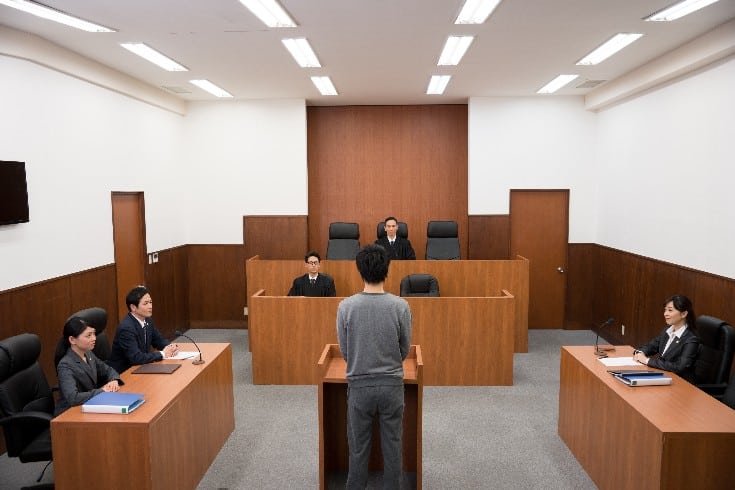What Actions Should Be Taken When Accused of Defamation Online

We have written several explanatory articles on how to respond when you are defamed online or become a victim of reputational damage. In this article, we will explain what to do if you are accused of being the perpetrator, based on the content of the articles we have written so far.
Even if you post something without any malice, especially because you can post anonymously and casually, the person you wrote about may feel defamed, become angry about their reputation being tarnished, identify the poster, and may try to sue.
In such cases, your response will vary depending on at what stage you realize that you have been accused of defamation, or that you have become a perpetrator. Moreover, you must respond appropriately at each stage.
Stage Where the Other Party is Unaware
If you realize that your post might be problematic before the other party notices it, and you can delete the article, that is, of course, the best scenario. If the article is not seen, it won’t hurt anyone. It is safer to delete articles that may be considered defamatory by the person written about, and that could potentially damage their reputation, before they spread.
In this regard, it is easy to delete posts on your own blog or social media.
However, the problem is that in most cases, the author cannot delete posts on anonymous bulletin boards or review sites. Most of the time, deletion is prohibited by the terms of use. Many people think that they can easily get their posts deleted by requesting it through the “Deletion Request Form” that is almost always set up on major bulletin boards, but in reality, they won’t delete it unless it’s a serious matter. Even if you request to “delete”, it is difficult to prove whether you are the original poster, and from the perspective of the bulletin board operator, they don’t want to lose users due to a reputation of “easily deleting people’s posts”.
Therefore, in such cases, even if you realize that your post might be problematic, all you can do is explain the situation to the site administrator, ask them to delete the article, and wait and see.
As with the procedures that follow, whether or not to delete is ultimately a major issue depending on whether the post you made is illegal. Many of the reasons why posts on the Internet become “illegal” are due to infringement of honor rights (defamation) and invasion of privacy. The conditions for these to be established are explained in detail in separate articles.
https://monolith.law/reputation/defamation[ja]
https://monolith.law/reputation/privacy-invasion[ja]
When You Receive an “Inquiry Regarding Notice of Infringement and Measures to Prevent Transmission”
“Measures to prevent transmission” refer to the deletion of online posts that defame or infringe on the privacy of individuals or companies, upon their request. This action is taken by the content, service, or provider that received the request.
Only the victim whose rights have been infringed or their representative can request these measures. Furthermore, this request is a legal matter, and only a lawyer can act on behalf of the victim.
Those who believe their rights have been infringed by the posted information will send a “Notice of Infringement and Request for Measures to Prevent Transmission” to the content, service, or provider. This notice includes the location of the post, the posted information, the rights claimed to be infringed, and the reasons for the infringement (such as the circumstances of the damage), and it requests the deletion of the post.
Upon receiving the complete set of documents for the request to prevent transmission, the content, service, or provider will conduct a review. Based on the Japanese Provider Liability Limitation Act, they will determine whether deletion is appropriate.
If deletion is deemed appropriate, they will send an “Inquiry Regarding Notice of Infringement and Measures to Prevent Transmission” to the sender to confirm their intent to delete the post. They will request a response within 7 days (or 2 days in the case of revenge porn).
If the sender agrees to the deletion, the post will be deleted. However, it is advisable to calmly consider what to do during these 7 days.
It is not necessary to agree when you receive an “Inquiry Regarding Notice of Infringement and Measures to Prevent Transmission”. Even if the person who posted the information believes they have been defamed and plans to seek damages later, it does not necessarily mean that defamation or privacy infringement has occurred. There are many cases of overreaction, and the request may be selfish and unreasonable. There may be no problem with the post, and the person who posted it may be in the right.
In such cases, you can simply respond to the inquiry with “I do not agree”. Even if you do not agree, you will not suffer any disadvantage later.
(Templates for all these documents are available on the website related to the Japanese Provider Liability Limitation Act.)
However, it can be difficult to judge whether your post was appropriate. If you consult with an experienced lawyer who has handled many cases related to online defamation, they can advise you on how to respond.
Note that the procedure for the person who was posted about to identify the poster is quite complicated. This article explains the perspective of the poster, but the following articles explain the perspective of the person who was posted about. Reading them together will help you understand the procedure for “identifying the poster” and what kind of documents the poster will receive during this process.
https://monolith.law/reputation/disclosure-of-the-senders-information[ja]
https://monolith.law/reputation/process-of-deletion[ja]
When a “Request for Opinion” Arrives from a Content Service Provider

Many people may be surprised when they suddenly receive a “Request for Opinion” in the mail. It’s unsettling to know that someone is seeking your personal information.
At this stage, many people may realize for the first time that an article they posted is causing a problem. Some may panic, but it’s important to respond calmly.
This “Request for Opinion”, formally known as a “Request for Opinion Regarding Disclosure of Sender Information”, is a document used by the provider to ask the sender whether it is acceptable to disclose the sender’s personal information when someone who has claimed defamation requests the provider to disclose the sender’s information. This is a procedure stipulated in the Japanese Provider Liability Limitation Act.
Decide whether or not to agree to the disclosure of personal information. You are required to respond within two weeks.
If the only thing being requested is the deletion of the article, the likelihood of being sued for damages in the future is low. However, if the disclosure of sender information is also being requested, there is a high possibility of being held legally responsible, so you should consult a lawyer promptly.
The response at this stage varies depending on the individual case. Leave it to a professional lawyer. At this point, it is advisable to avoid handling it on your own.
When You Receive an “Inquiry Letter” from an Internet Service Provider
At the stage when you receive an “Inquiry Letter” not from the site where you posted, but from the Internet Service Provider (ISP), even if you refuse to disclose, the victim has already received disclosure of sender information such as IP address and timestamp, after the judgment of the Content Service Provider. As it is often the case that a judge has already acknowledged the illegality of the article through a trial, you should recognize that your position is quite unfavorable.
The victim is trying to identify the person who posted by gathering evidence of rights infringement and making a request for disclosure of sender information, and is trying to make a claim for damages. They are likely also taking provisional measures to prevent the deletion of sender information, such as ensuring access logs are not erased.
When Agreeing to Disclosure
If you agree, the sender’s information such as “address, name, email address” etc., will be sent to the person claiming damages. If you agree, you will likely need to seek a discussion aimed at reconciliation with the person claiming damages.
When Not Agreeing to Disclosure
If you do not agree to the disclosure, there may be cases where the information is disclosed at the discretion of the provider. However, as a rule, the provider will not comply with the disclosure of sender information unless the sender agrees, so the request for disclosure of sender information is generally done through a lawsuit. The main point of contention in the lawsuit is whether the content of the target post, etc., clearly infringes on the rights of the plaintiff (the person requesting disclosure). If you intend to dispute, please consult with a lawyer about the outlook.
At the stage when a request for disclosure of sender information is made, it is almost certain that the other party has a lawyer.
When a Case Goes to Court

In the Event of a Civil Lawsuit
Defamatory actions fall under Article 709 of the Japanese Civil Code (民法第709条), which states, “A person who intentionally or negligently infringes the rights of others or legally protected interests of others shall be liable to compensate for the damages arising from such infringement.” Based on this, you may be asked to pay damages. The main grounds for tort are “defamation of personality” and “invasion of privacy”.
Honor refers to the objective evaluation one receives from society, and actions that lower this social evaluation constitute an infringement of the right to honor.
Furthermore, even if it is true, if you disclose information that the other party does not want to be known, you may be infringing on their right to privacy.
If you are sued for damages based on tort and lose the case, you will have to compensate for the “damages” suffered by the victim due to the post. There are certain rules for calculating this amount of damages, which can be broadly divided into:
- Consolation money
- Legal fees the victim incurred to identify the poster
- Legal fees the victim incurred to claim damages
The total of these will be the amount of damages.
https://monolith.law/reputation/calculation-method-of-compensation-for-damages[ja]
https://monolith.law/reputation/compensation-for-defamation-damages[ja]
In the Event of a Criminal Case
If you are criminally charged by the other party, there is a possibility that you may be arrested as a “criminal”.
Defamation is defined in Article 230, Paragraph 1 of the Japanese Penal Code (刑法第230条1項) as, “A person who publicly states a fact and defames the honor of another person shall be punished by imprisonment for up to three years or a fine of up to 500,000 yen, regardless of whether the fact is true or not.”
The crime of insult is defined in Article 231 of the Japanese Penal Code (刑法第231条) as, “A person who publicly insults another person, even without stating a fact, shall be punished by detention or a petty fine.”
The crime of credit defamation is defined in Article 233 of the Japanese Penal Code (刑法第233条) as, “A person who spreads false rumors or uses deception to defame the credit of another person or obstruct their business shall be punished by imprisonment for up to three years or a fine of up to 500,000 yen.”
The crime of forcible obstruction of business is defined in Article 234 of the Japanese Penal Code (刑法第234条) as, “A person who uses force to obstruct the business of another person shall also be punished in accordance with the preceding article.”
If you are charged with these crimes and receive a “prison sentence”, “penal servitude”, or “fine” (including suspended sentences), you will end up with a criminal record.
Considering Settlement Negotiations
The stage of “going to court” is also the stage of “considering settlement negotiations”.
A settlement is a resolution method where the offender pays compensation to the victim to reach an agreement. Defamation is a crime that becomes a criminal case only when the victim files a complaint. Therefore, if a settlement is reached through negotiation and the victim withdraws the complaint, there will be no further pursuit, and naturally, the possibility of having a criminal record will also disappear.
There are no specific rules for conducting a settlement, but in most cases, the offender will seek an opportunity to discuss with the victim, along with an apology.
Understanding criminal and civil procedures is necessary to discuss and agree on the content. It is impossible for someone without legal knowledge. Either the victim or the offender, or both, should hire a lawyer to negotiate.
Summary
Whether you are facing potential litigation or have already been sued, not just in cases of online defamation, it is advisable to consult with a lawyer at an early stage and aim for a swift resolution.
Monolith Law Office, known for its strength in handling online defamation and reputational damage cases, also provides defense for the perpetrators of defamation. However, due to the restriction that a lawyer cannot become the representative of the other party in a case where they have received legal consultation, we are unable to accept casual legal consultations from the victim’s side.
We have detailed information about the defense of defamation perpetrators on the page below. We would appreciate it if you could read through to the end and consider contacting us if you are considering requesting our services.
Category: Internet





















